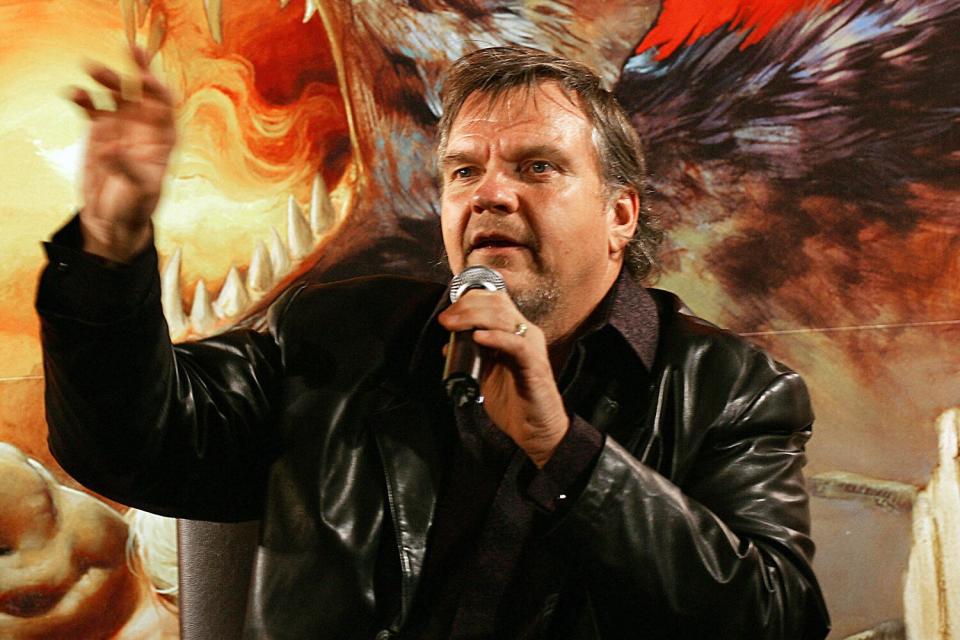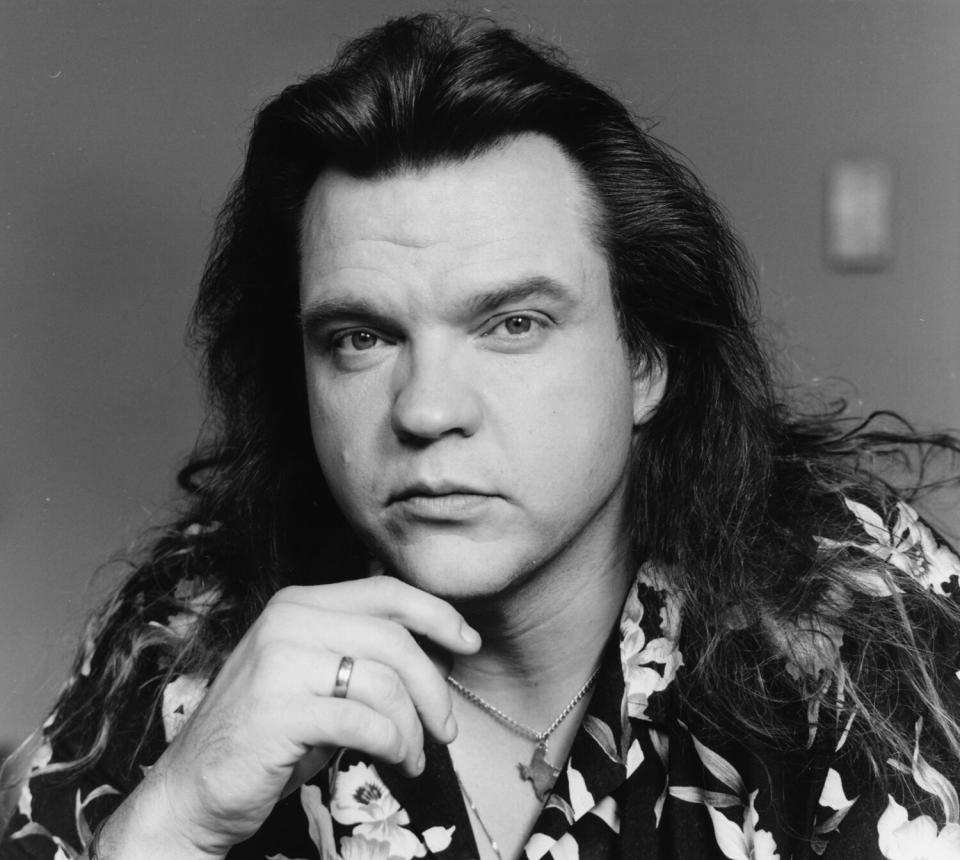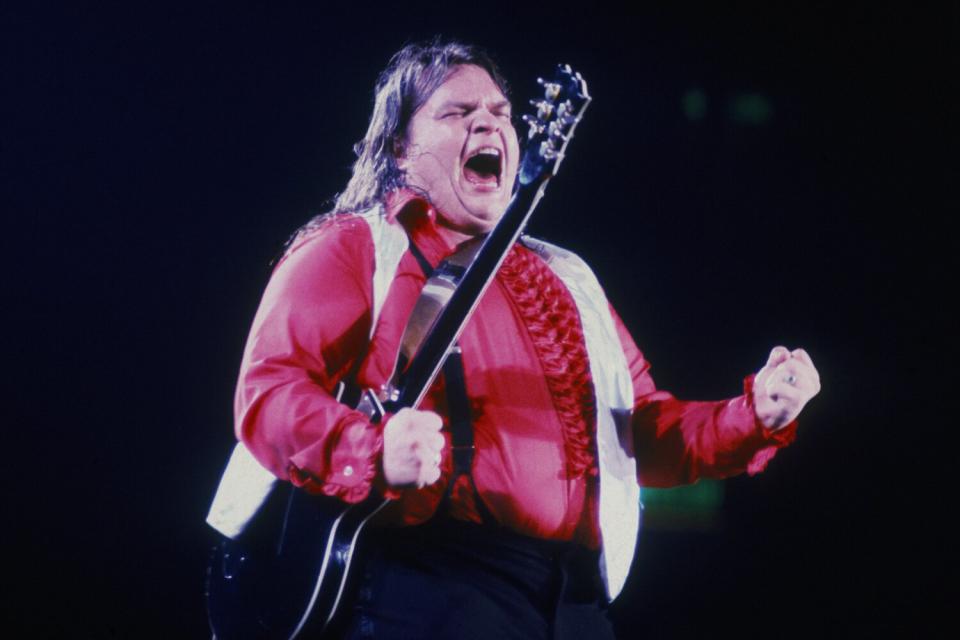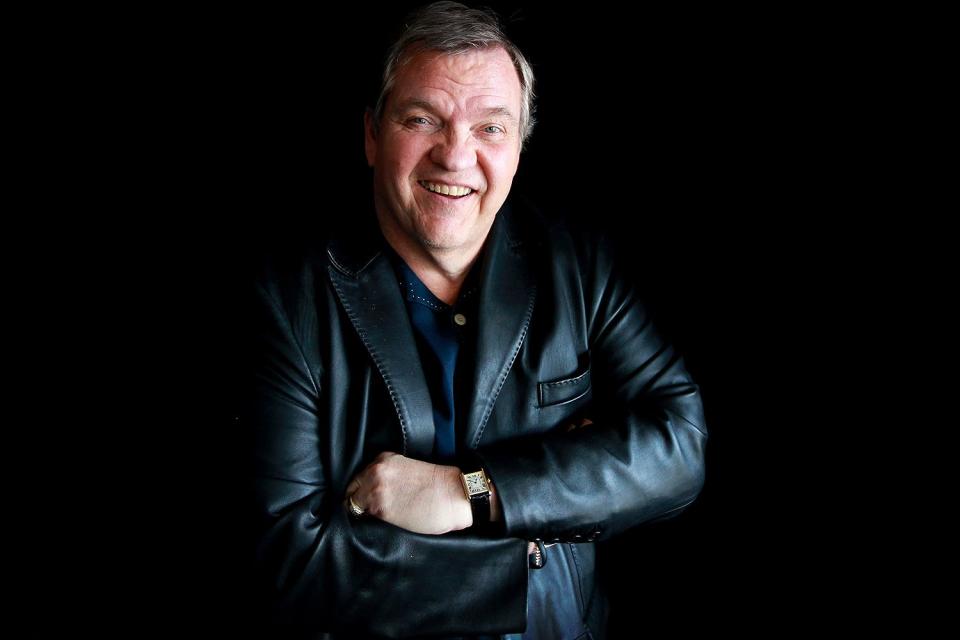Meat Loaf in His Own Words: 'My Natural Voice Is Opera' but 'I Have the Rebellious Nature' of a Rocker
- Oops!Something went wrong.Please try again later.
- Oops!Something went wrong.Please try again later.
Legendary singer Meat Loaf died on Thursday at the age of 74. Right before the release of his final studio album, Braver Than We Are, he sat down with PEOPLE in 2016. The singer had suffered, and overcome, a series of health scares through the years, but he was insistent he was "fine" while keeping his focus on work — and proudly singing in the same key.
Below, Meat Loaf gets candid about the clash between his operatic voice and his rock-and-roll spirit, cites his musical influences and details the acting training that led him to memorable roles in projects including Rocky Horror Picture Show and Fight Club…

TED ALJIBE/AFP via Getty Images
Meat Loaf has a cold. That voice – superhuman, louder than a locomotive, able to leap tall octaves in a single bound – sounds hoarse and congested over the telephone today. He's convinced it's allergies. I offer my apologies, which he quickly dismisses. "You don't control the pollen. OR DO YOU!?"
He's joking, but I'm momentarily terrified. To be on the receiving end of Meat Loaf's roar, even at half blast, can be intimidating. It'll take a hell of a lot more than a case of sniffles to enfeeble that larynx, an instrument that's unleashed rock arias for more than four decades.

Michael Putland/Getty
Allergies are the least of my worries. Just a few weeks before we spoke, the 68-year-old terrified fans by collapsing mid-song during a concert in Alberta, Canada. The official release cited "severe dehydration" as the reason. My ginger inquiries into his health are met with a curt "I'm fine."
Of course he is. It's far from the first time he's taken an unscheduled breather onstage. In 2011 he fainted during a gig in Pittsburgh, and in 2002 he was hospitalized after collapsing at London's Wembley Arena. And don't forget the time in the '70s when he leaped off the stage and shattered his leg. There's the car that flipped over, the near-plane crash and the 12-pound metal sphere that whacked him on the head during a high school shot put event.

Dave Hogan/Getty Images
Yes, the man has launched a thousand pre-written obits, yet he's still here, delivering the same marathon performances with the power and intensity of an Olympian. But today he seems far more preoccupied by his voice. Though the pollen gunk will pass, he's concerned by a contingent of Twitter trolls who've shared uncomplimentary reviews of his recent North American tour. "I hate the internet," he snarls, "They write, 'Awww, it's too bad he lost his voice!' Excuse my language but, 'F— you!'"
He's quick to point out that nearly all of the songs he performs – most of which span three-and-a-half octaves – are performed in the same key he first recorded them as a twenty-something. You don't have to be a Juilliard grad to know that's an impressive feat. He's particularly proud of the high Cs he hits at the end of "Bat Out of Hell," the 10-minute epic that's become his touchstone. "If you got within three feet of me your ears would bleed. That's how loud I am. Even still. And I was louder before."
While Bat Out of Hell, his 1977 breakthrough smash, is currently the fifth highest selling album of all time, Meat Loaf does not consider rock and roll to be his true métier. "I'm not a natural rock singer like [Cheap Trick's] Robin Zander. Robin is a rock singer, so his voice hasn't changed that much. Billy Joel wrote all his songs, and so he wrote them for his voice. I had to learn how to sing 'Bat Out of Hell.' My natural voice is opera."
He isn't lying. After singing in a Central Park production of Shakespeare's As You Like It in 1972, wealthy art patrons offered the 25-year-old $60,000 to train his voice and make his debut at the MET. As you might have have guessed, he turned them down. "I went, 'No, I can't do that, because I'll wind up in prison for murder of the conductor.' I may be an opera singer, but I have the rebellious nature of a true rock and roller."
But Meat Loaf is not your typical rock star. His influences range from the usual classics – Joe Cocker, Roger Daltrey, Janis Joplin – to mid-century Broadway musicals like Oklahoma!, Carousel, and Annie Get Your Gun ("Ethel Merman was like a God to me," he says). As far as he's concerned, the intention of the singer is just as important as the notes they sing.
What do you get when you mix rock and roll spirit with operatic power and highly attuned acting skills? You get Meat Loaf's latest album, Braver Than We Are. Forged from the same fire that produced Bat Out of Hell 39 years earlier, it's his first full scale collaboration with composer Jim Steinman since 1993's Bat Out of Hell II: Back into Hell. That disc sold over 15 million copies and spawned the later-career perennial "I'd Do Anything for Love," which earned him a Grammy for Best Solo Rock Vocal Performance.
For sheer sales numbers, the Meat Loaf/Steinman duo ranks among the most successful partnerships in pop music history. Braver Than We Are does their legacy proud with an assemblage of 10 tracks smoldering with ferocity and bombastic rhapsody. The ornery opener, "Who Needs the Young," is the first song Steinman ever wrote at age 19, kicking off the collection with an authentic burst of teenage angst.
Never short on epics, four of the songs clock in at over six minutes in length. The longest, the 11-minute "Going All the Way Is Just the Start (A Song in 6 Movements)," is an affectionate nod to their Bat Out of Hell standout "Paradise By Dashboard Light" – featuring sisters in song Ellen Foley (who sang on the original) and Karla DeVito (who appeared in the song's video). Meat Loaf cites the opening verse as the best singing he's ever done.

Keystone/Hulton Archive/Getty Images Meat Loaf in 1977
From soaring vocals unspoiled by time to guest appearances from longtime Lynyrd Skynyrd guitarist Rickey Medlocke, there's much to like on Braver Than We Are. But what he likes the best about the record is both simple and confusing: he can't hear himself in it at all.
Where Meat Loaf should be, he only perceives a character.
"I woke up at 3:15 in the morning two days ago and came into my office and listened to my record seven times in a row because I was looking to see if I could ever hear Meat Loaf sing a line. And I couldn't… I've never listened to a record I've done seven times, ever. And I will hear it again tonight before I go to sleep tonight, I guarantee you."
Calling on his background in theater, Meat Loaf approached each song by dissecting the lyrics as an actor would a script. "I've never asked Jim why he wrote a song," he says with pride. Instead, he credits the Meisner acting technique with helping him construct the characters and their backstories.
"Meisner is the truth is on the page. And as the actor, you have to find out what your truth is inside your character at that moment." The truth could sometimes be hard to find. He agonized over the words, trying to build personas by using nothing but his vocals. "There would be three days where I would do nothing but sit and study the lyrics. I wouldn't walk into the recording studio."
To preserve what he calls "the truth of the moment," he recorded many of the songs in one complete take. "I read the other day, 'I bet they used all the tricks in the book on this record.' We didn't. It is what it is."

Cameron Richardson/Newspix/Getty Meat Loaf
So what is it? It's an unabashedly unique record loaded with emotional integrity. "It sits in the same world that Bat Out of Hell sits in the fact that Bat Out of Hell did not belong in that time period. It was so foreign and so far removed from anything else, and the same goes for this record. There's no time period for it. It just exists. It exists in truth and moment."
Though the most visible of the pair, Meat Loaf makes sure to give Maestro Steinman his share of the spotlight. "He's one of the best writers to ever live," proclaims the singer. "Bottom line. He's in there with Irvin Berlin and Gershwin." More than their mutual respect for one another's craft, their shared gusto for life keeps bringing them back together.
"We've always been accused of being over the top and whatever, but the world is over the top. People who live in the world are over the top. They just refuse to acknowledge it. Jimmy has a line, 'If you don't go over the top, how do you know what's on the other side?'"

